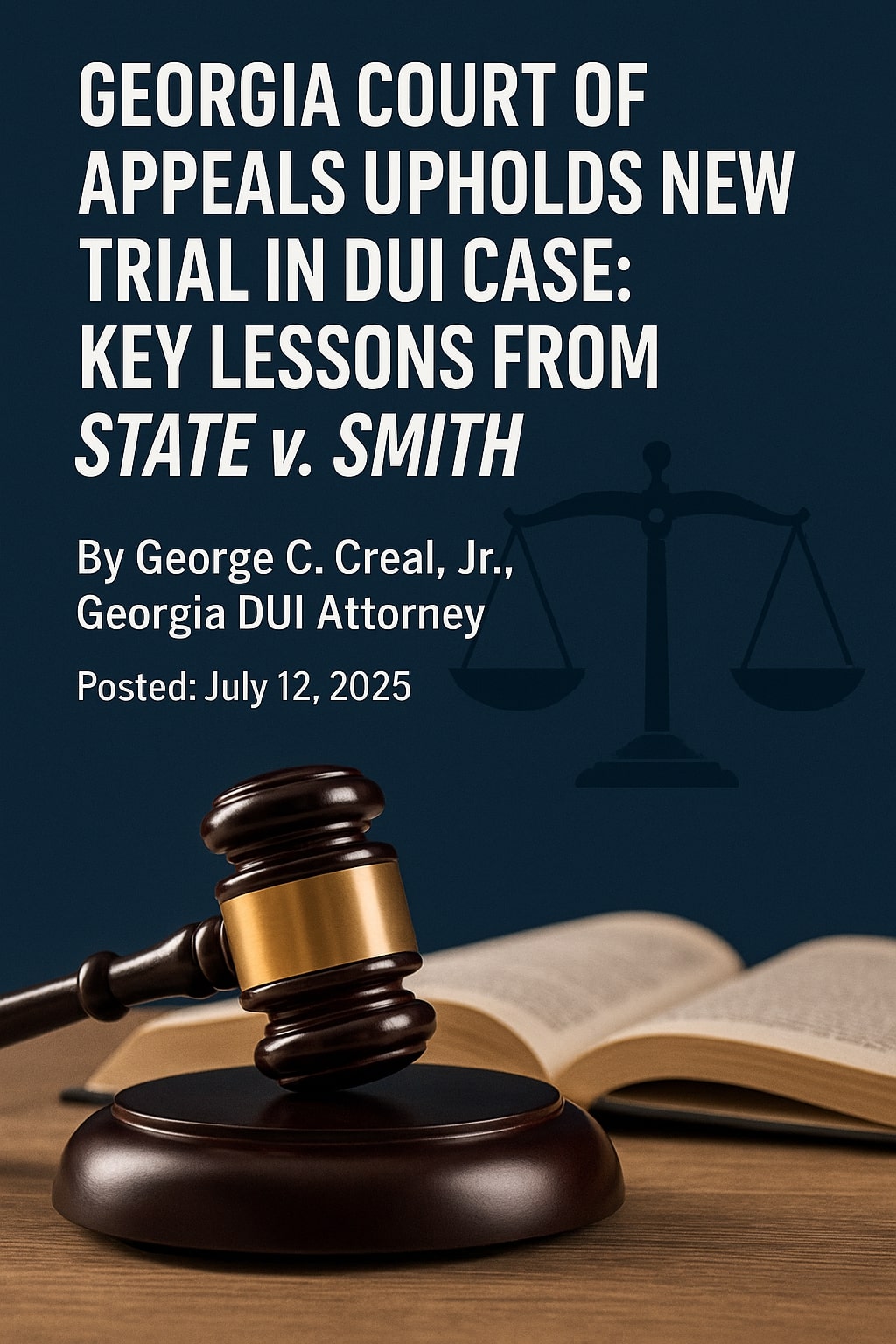At George C. Creal, Jr., P.C., Trial Lawyers, we pride ourselves on staying ahead of the curve in DUI defense strategies across Georgia. A recent decision by the Georgia Court of Appeals in The State v. Smith, 914 S.E.2d 546 (2025), decided on March 25, 2025, underscores the importance of challenging prosecutorial errors and weighing evidence carefully in DUI cases. This ruling, which affirmed a trial court's grant of a new trial after a DUI conviction, highlights how false information and conflicting evidence can tip the scales in favor of the defense. As experienced DUI attorneys, we're breaking down this case and its implications for anyone facing similar charges.
Case Summary: State v. Smith

At trial, the central issue was whether Smith had actually driven to the scene. The prosecution relied on Smith's statements to the trooper, such as "I wouldn't have drove if I was drunk" and "Next time, I know not to take my ass to try to help nobody else," implying she drove. Another officer testified that he believed Smith drove based on the vehicles present. However, no one directly saw her driving, and the trooper never explicitly asked if she had.
The defense presented conflicting testimony: Witnesses Danny Brockington and John Guest (Smith's boyfriend) stated that Guest drove Smith to the scene, with Brockington following in a separate car. They arrived before law enforcement, and Guest explained he didn't correct the trooper due to past negative experiences with police.
Adding complexity, the State introduced evidence of a 2019 DUI conviction and questioned a trooper about a supposed 2012 DUI conviction, putting Smith's character in question without prior notice. Defense counsel objected and moved for a mistrial. The court instructed the jury to disregard the 2012 reference but didn't rule on the mistrial. During closing arguments, the prosecutor suggested defense witnesses were "covering up" because "this is at least her second DUI."
The jury convicted Smith of DUI less safe. At sentencing, the State argued for a harsher penalty based on two prior DUIs (2012 and 2019), leading to a 12-month sentence with 90 days in jail. However, post-trial, it emerged that Smith was not convicted of DUI in 2012—only failure to use due care. The State conceded the error.
Smith moved for a new trial, arguing the verdict was contrary to the evidence, against the weight of the evidence, and tainted by false information about the 2012 conviction. The trial court granted the motion, expressing concern that the mistaken impression of two prior DUIs may have influenced the jury, especially given the "pretty close" evidence and strong defense testimony.
The State appealed, but the Court of Appeals affirmed. Construing the order under the "general grounds" (OCGA §§ 5-5-20 and 5-5-21), the appellate court found no abuse of discretion. The trial judge, acting as the "thirteenth juror," could weigh conflicts in evidence, witness credibility, and the impact of the false prior conviction information. The court emphasized that even legally sufficient evidence can warrant a new trial if it preponderates heavily against the verdict.
Why This Decision Matters for DUI Defense in Georgia
State v. Smith is a reminder of the power of trial courts to grant new trials when justice demands it, even after a conviction. Key takeaways include:
- Challenging Prior Convictions and Prosecutorial Errors: The case shows how introducing unverified or incorrect prior offenses can prejudice a jury and lead to a new trial. DUI cases often involve "prior similar transactions," but the State must provide notice and accurate information. Here, the lack of notice and factual error about the 2012 incident highlighted improper character evidence, strengthening the defense's position.
- The Importance of Conflicting Evidence: DUI less safe charges hinge on proving impairment made driving unsafe. With no direct observation of driving and strong defense witnesses contradicting the State's inferences, the evidence was "close." This ruling reinforces that juries—and judges—must carefully weigh such conflicts, opening doors for motions for new trial when verdicts seem unjust.
- Trial Court's Broad Discretion as the 'Thirteenth Juror: Under OCGA §§ 5-5-20 and 5-5-21, judges can grant new trials if the verdict is against the principles of justice or the weight of the evidence. Appellate courts defer to this discretion, especially for the first grant of a new trial. This case illustrates how effective advocacy on credibility and evidentiary issues can sway outcomes post-verdict.
- Broader Implications for Sentencing: The erroneous belief in multiple priors affected sentencing. Defendants should always verify priors during discovery to avoid inflated penalties.
This decision builds on Georgia's commitment to fair trials in DUI cases, where evidence of actual driving and impairment must be solid. It empowers defense attorneys to scrutinize every detail, from arrest circumstances to trial errors.
How George C. Creal, Jr., P.C., Can Help with Your DUI Case
At our firm, we've successfully defended countless DUI cases by challenging weak evidence, improper procedures, and prosecutorial missteps—just like in State v. Smith. Whether it's disputing field sobriety tests, prior convictions, or the lack of direct proof of driving, we build aggressive defenses tailored to your situation. If you've been convicted but believe errors occurred, we can explore motions for new trial or appeals. Serving clients across Metro Atlanta and Georgia, including Fulton, DeKalb, Clayton, Gwinnett, Cobb, and beyond, we're ready to fight for you.
Facing DUI Charges? Contact Us Today
Don't let a DUI conviction stand if justice wasn't served. Call George C. Creal, Jr., P.C., Trial Lawyers, for a free case evaluation. We'll review your arrest details and explore all options, including those inspired by cases like State v. Smith.
George C. Creal, Jr., P.C., Trial Lawyers
480 John Wesley Dobbs Ave NE, Unit 190, Atlanta, GA 30312
Phone: (404) 333-0706
Email: [email protected]
Website: www.georgecreal.com
Disclaimer
This blog post is for informational purposes only and does not constitute legal advice. Contacting our office does not create an attorney-client relationship. Every case is unique, and outcomes depend on specific circumstances.

